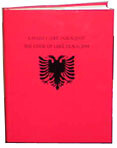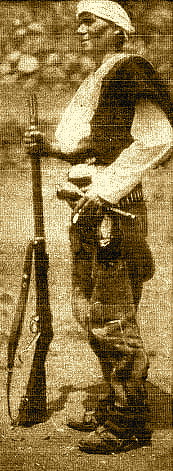[cross-posted from QUENCHZINE]
so. i've been wrestling myself into circles trying to find a handhold on the seemingly un-pinnable conglomeration of subjects i've been wanting to post about.
i decided to start at the beginning, and the beginning i chose - this being a circular collection of issues, remember - is about the sworn virgins.
you are now wondering what the fuck ms zilch is talking about, right? i mean, what the fuck is a "sworn virgin"? a nun? oh no, my darling quench readers. not nearly.
let us now segue to the balkans. culturally, the balkans is a patchwork of seemingly disparate groups. the clan-based, isolationist, highly sex-divided, highlander culture of what was once the roman empire's wildest province is divided linguistically (albanian, croatian, bosnian-serbian-montenegrin; rroma, greek and rumanian minorities) and religiously (roman catholic, russian orthodox and muslim; also the now-extinct bosnian church).
however, in truth, there is a shared common social culture among albanians and the slavs of the croat, bosnian, serbian, montenegrin and potentially other forms; all of these speak languages related to more familiar languages like english and french (though albanian is probably most closely related to greek and armenian with a significant overlay of ancient latin borrowings and more recent slav ones). beyond common social culture, the ottoman empire held sway over this region for quite a while, and found it a great source for its ruling class, which was composed of children taken from their homes at an early age and raised in groups.
 here's the thing: ancient clan law presumes no state. using albanian traditions, for example, the generally accepted social norms are derived from the canon of lek dukagjini, which is in modern terms a brutally barbaric system that prefers death as a punishment for even seemingly small offenses and expects blood-debt. that is, if a member of clan a dies because of clan b, clan a is entitled to murder a random member of clan b in return. let me emphasise that the actual murderer being caught and killed would just be a coincidental; any member of clan b is an acceptable victim.
here's the thing: ancient clan law presumes no state. using albanian traditions, for example, the generally accepted social norms are derived from the canon of lek dukagjini, which is in modern terms a brutally barbaric system that prefers death as a punishment for even seemingly small offenses and expects blood-debt. that is, if a member of clan a dies because of clan b, clan a is entitled to murder a random member of clan b in return. let me emphasise that the actual murderer being caught and killed would just be a coincidental; any member of clan b is an acceptable victim.
this code, which is often just called "the Kanun" for short, is lex talionis at its best. while communist leadership kept an iron fist on the country to stop the kanun law from continuing, the fall of communism meant a near-instant return to its standards.
so - what the hell is a "sworn virgin"? well, to be fair the kanun, not everyone is subject to blood-debt. the underage and women, for example, are not permissible targets. they are untouchable. the reason for this, of course, is that only full, adult males are actually people under the law. as is so tiresomely common in eurasia's traditional cultures, women are property.
 which brings us to the situation of the virgjineshtë "sworn virgin" - the picture at left of a slav tobelija (their term for it) was published in 1907 by a doctor e schultz in Die Woche – Moderne Illustrierte Zeitschrift, 40. you see, when clans were feuding - and when were they not? never. - adult males were subject to punitive death. that means that a clan under blood debt (as adjudged, mind you, by the other clan) had to secure its adult males else they be murdered. beyond blood-debt, open warfare was also endemic, lack of healthcare was appalling, and the various levies by the ottomans further sapped the families of potential adult males. the result of this situation was that families could be sharply short-handed of adult males to fulfil their social and work roles - a family whose men were all dead had no patriarch as required by the kanun and had no men to do the men's work and defend the homestead from dacoits.
which brings us to the situation of the virgjineshtë "sworn virgin" - the picture at left of a slav tobelija (their term for it) was published in 1907 by a doctor e schultz in Die Woche – Moderne Illustrierte Zeitschrift, 40. you see, when clans were feuding - and when were they not? never. - adult males were subject to punitive death. that means that a clan under blood debt (as adjudged, mind you, by the other clan) had to secure its adult males else they be murdered. beyond blood-debt, open warfare was also endemic, lack of healthcare was appalling, and the various levies by the ottomans further sapped the families of potential adult males. the result of this situation was that families could be sharply short-handed of adult males to fulfil their social and work roles - a family whose men were all dead had no patriarch as required by the kanun and had no men to do the men's work and defend the homestead from dacoits.
"sworn virgins" were a solution to this problem, one so ancient that the 12th century duke lek dukagjini just took them for granted as part of the natural order of things. either in childhood or later in life, a biological woman had the right (one of her few rights, incidentally) to declare herself publicly a virgjineshtë. henceforth, the vow-taker would take on the rights and responsibilities of a male - except that they did not marry women or engage in sexual contact, nor were they subject to blood debt. they could not be murdered in vengeance, and hence were an excellent solution for a tapped-out clan.
motivations and reasons aren't something i care to speculate about. i dunno how many girl-children were tomboys who donned trousers and started smoking and shooting and running around barefoot because that was their nature and how many were forced into that role. i don't know how many people were gender dysphoric and chose a life of celibacy as a man over a life as someone's woman after they entered puberty. i don't know these things; few tobelija or virgjineshtë have been interviewed about this issue. partially this is because they are a dying breed; partially this is because men don't talk about their emotions; partially, this is because they may not have the words and tools to talk about what they feel or might not want to talk to an outsider about their most sensitive of issues.
the point of this discourse is not just to show that there are transpeople in premodern europe, or a third sex. rather, it is to highlight the role women played in eurasia in general: as property. women are a bottle of wine whose cork must not be popped; this ensures their vintage is untainted - that their wombs aren't carrying another man's baby. sworn virgins could have their freedom once they declared themselves asexual - but they were killed, often by their own kin, if they transgressed these rules. i thought that perhaps i could start talking about the idea of the virgin if i teased out some of these ideas with the strange but also strangely familiar idea of the woman-as-man. we'll see. for now, i'm going to pause in my diatribe, which i hope to continue soon in part the second.
No comments:
Post a Comment